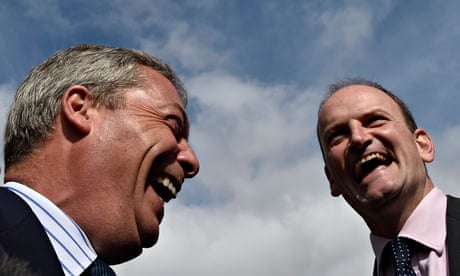When commentators talk about political events being "seismic" we are usually guilty of gross exaggeration. The tectonic plates bump and they grind. We feel a tremor here and a shudder there, but it is not often that the roof comes in. Major shifts in the underlying structures of our politics are rare. But they do come along sometimes and when they do, the resulting earthquakes can collapse the grandest of mansions.
In the early decades of the 20th century, the Liberals split between Asquith's supporters and the followers of Lloyd George. A once-commanding party was shattered, never to be revived, clearing the way for Labour and the Tories, mainly the Tories, to dominate government. Towards the end of the 20th century, Labour had an existential crisis when the moderate revolt against the party's lurch to the left led Roy Jenkins and his friends in the Gang of Four to form the breakaway SDP. The Tories governed for 18 uninterrupted years and people asked whether the Labour party would ever again form a government. In a sense, you could say it never did since the next time a non-Tory government came to power it was under the strikingly unsocialist Tony Blair trading as New Labour.
While the progressive side of politics divided itself during the last century, the right and its voters broadly stuck together massed behind the Conservative party. Being united when your opponents are divided is a great advantage and the more so when competing in a first past the post electoral system designed to accommodate just two players. The Tories exploited that to enjoy a disproportionate share of power.
Now it is the Tory party that is doing the splits over what it means to be on the right-hand side of British politics. A decades-long quarrel within Conservatism, a struggle that is not just about Europe, but is most ferociously fought on the battlefield of Europe, is coming to its head. If the Tories win the next election and David Cameron is able to deliver on his promised referendum on membership of the European Union, that referendum will be the site of the climactic battle for the soul of Conservatism. If the Tories lose the next election, the final struggle may be postponed or it may be brought on quicker. Such is the volatility of the politics of the right, I wouldn't want to make a guess.
The last time that the Tories were so divided on a fundamental question was in 1846 when they came apart over the Corn Laws, putting them out of power for a generation. Are we now feeling the first tremors of a truly seismic moment, an earthquake that leaves the Conservative party as rent asunder as it was under Sir Robert Peel? That is the big question prompted by the defection of Douglas Carswell from the Conservatives to Ukip.
Just when David Cameron thought he'd secured a temporary truce with the Europhobes, just when he was beginning to think that his MPs would lay off him until next May, just when he hoped that the voters and the media might be getting a little bored with Ukip, just when he planned to make a recovering economy the focus of attention, the grinning mug of Nigel Farage is all over the airwaves again parading his catch from the Tory benches like a fisherman who has just landed a prize trout.
Mr Carswell has a few awkward things to navigate, such as Clacton's existing Ukip candidate who is very disgruntled at the prospect of being displaced. It will be enjoyable to see how a self-described libertarian, radical democrat with some liberal instincts on immigration reconciles his professed philosophy with joining a party as authoritarian, reactionary and anti-immigrant as the Kippers. But that sort of philosophical question probably won't have much bearing on his prospects of holding the seat in the byelection that he has triggered. His chances of becoming the first Ukip MP to be elected to parliament wearing the party's rosette look very promising. The bookies make him favourite to win. So do the psephologists. So do the private forecasts of both Tory and Labour strategists. If you were to pick the most propitious place for Ukip to win its first parliamentary byelection, you would hit upon this unaffluent Essex seaside town packed with precisely the type of white, older, non-metropolitan voter whose discontents Ukip has been so adept at turning into support.
If he wins, will it prompt more Tory MPs to throw in their lot with the Farageistes? Maybe. Maybe not. I am a bit doubtful that there will be a flood of further defections, at least not this side of the general election. By the way he has handled his switch, Mr Carswell has made it riskier for others to follow him. The media and the Tory whips are now playing Hunt the Defector, forcing disavowals from other Europhobic MPs who are suspected of playing footsie with Nigel. By taking the "honourable" course of resigning the seat to re-contest it in his new purple and yellow colours, Mr Carswell has set a precedent that any other floor-crosser would be under intense pressure to follow. Other Ukip-inclined Tories might not be so confident that they could hold their seats in a byelection.
Obviously, it will deepen the nightmare of being David Cameron and widen the grin on the face of Nigel Farage if Mr Carswell's example is emulated. But how many Tory MPs make exactly the same journey is a second-order question. It is the response of his former colleagues that is telling. A few cry treachery. Quite a lot scratch their heads at his timing and wonder at his tactics, taking the line that it is counterproductive to their cause to make it less likely that there will be a Tory government after the next election and therefore less likely that there will be a referendum on EU membership. That is the main reason why few Tory MPs may be tempted to follow him over to Ukip this side of the general election.
But they smile approvingly on everything he says about Europe and David Cameron. On the issue that drove his defection and animates his fellow Europhobes, on the big one – in or out? – they are clearly with him in spirit. They don't actually have to leave the Tory party to be fellow travellers with Mr Carswell. Even if they still hold Tory membership cards, even if they pay lip-service to waiting to see the result of a renegotiation before making up their minds, in their heads they have already signed up to the Ukip proposition that we are better off out.
David Cameron could come back from Brussels with the promise to give every citizen of Britain a million euros and they would still think we were better off out. So would many Tory activists. The Carswell defection was a shock to Number 10, but it should not have been altogether a surprise because the split through the Tory party at a grassroots level is already far advanced. Conservative MPs often tell me that they have lost significant chunks of their membership to Nigel Farage's gang. I also often hear Tory MPs report that, among those activists who haven't left, many are closet Ukip supporters.
It is true that Ukip has been taking votes from all parties. It is true to say that it also harvests support from people who have not previously or only rarely voted. But the polling suggests that going on for half of their supporters voted Conservative at the last election. Several factors have been powering the rise of Ukip and there are places where it is a menace and a worry for Labour too, but it is first and foremost the manifestation of a struggle for who owns the right of British politics.
The Tory schism over the Corn Laws was not just about the price of bread. It was the climax of a fundamental clash that had been brewing for years and which manifested itself in splits over a series of issues. One, now utterly obscure, fight was about the funding of a Catholic seminary in Ireland. A more modern, more enlightened, more open version of Toryism advocated by Sir Robert Peel was pitted against a more insular, more reactionary, more closed concept of what it means to be on the right-hand side of British politics. History does not repeat itself, but it can rhyme. As with the battle over the Corn Laws, the contemporary crisis of Tory identity has been building for a generation. It similarly pits two versions of Conservatism against each other. It similarly manifests itself in a series of diverse, blue-on-blue clashes: gay marriage, the size of the aid budget, immigration. It is about more than Europe, but Europe is the principal battlefield on which it will be fought.
On both sides, they are girding themselves for the great schism on the right, the battle to the death that will follow the election, a struggle not just for the soul of the Tory party, but about the future of Britain in the world. Where those of his fellow travellers who are still in the Tory party differ with Douglas Carswell is only in that they have decided to wait until after the general election before they start the shooting.

